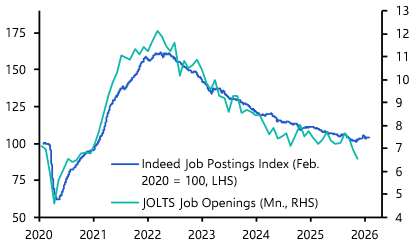Andrew Hunter, our US Economist discusses the following:
- Will inflation remain benign with the unemployment rate below 4%?
- Does the fiscal stimulus mean the Fed needs to hike rates more aggressively?
- Could a trade war cause significant damage to the economy?
Stephen Brown, our European Economist, discusses the following:
- Can the euro-zone put the soft first quarter behind it?
- Will a jump in inflation prompt aggressive ECB tightening?
- Have Europe’s structural problems been addressed?
Mark Williams, our Chief Asia Economist, discusses the following:
- What is behind the recent run of strong growth and higher inflation?
- Are these trends likely to be sustained?
- Will the Bank of Japan be in a position to tighten?
John Higgins, our Chief Markets Economist, discusses the following:
- A re-cap of the economic outlook
- What are the market implications?
- Currencies
- Bonds
- Equities
- Conclusion
At our Developed Markets Forecast Forum in May 2018 we discussed what might knock the world’s biggest rich economies off their recent strong growth course. In the case of the US, the recent fiscal boost should ensure that momentum holds up for a while. It will fade next year though at a time when tighter monetary policy will also be weighing on domestic demand. The result is likely to an economic slowdown that prompts the Fed to change course much sooner than most currently expect. By contrast, the euro-zone recovery – Q1 weakness aside – should continue for some time. Italy’s populist turn is a reminder that the fault lines that at one point imperilled the euro-zone’s future haven’t gone away. But they can be papered over as long as growth remains strong. Finally, on some measures, Japan’s economy has recently enjoyed its strongest run of growth since the 1980s bubble. Growth is now fading as capacity constraints bite, yet inflation is still very subdued. As a result, while the Fed is set to continue tightening policy and the ECB is moving in that direction, the Bank of Japan will remain in ultra-accommodative mode. And that divergence between monetary policy stances will, we suspect, be the key driver of moves in developed world financial markets over the next couple of years.
Start date:

